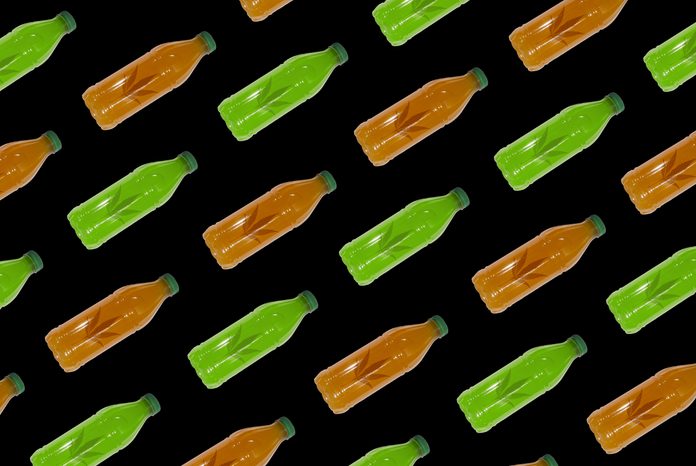CBD Drinks Are Everywhere — Will They Help Me Relax?

This is what you need to know about drinkable CBD, including what they’re supposed to do, if they have any negative effects and how to buy them.
Since cannabis was legalized in Canada, there’s been an explosion in the cannabis beverages market, with some reports estimating it to be worth USD$2.8 billion by 2025. CBD (or cannabidiol) drinks are forecasted to be the fastest growing segment.
By now, you’ve probably heard all about the supposed health benefits of CBD: it’s thought to help with anxiety, relieve pain and might even reinvigorate your sex life. But are these benefits real? And why is CBD, and not its high-inducing sister THC, the star of the cannabis drink game?
(Related: Can Cannabis Help Kick-Start My Sex Drive?)
What are CBD drinks?
In a nutshell, CBD is one of the two main cannabinoids (chemical compounds) found in cannabis. The other main cannabinoid, THC, is responsible for the “high” experienced when using cannabis. CBD is the non-psychoactive and non addictive cannabinoid found in cannabis.
CBD drinks are made by infusing water with CBD particles. The result is a canned, usually sparkling drink that’s similar to flavoured sparkling water or a spiked seltzer like White Claw. There are some “CBD-only” drinks on the market but it can be hard to find one that doesn’t have a trace amount of THC (for example, this Strawberry Hibiscus Sparkling Water contains 0.5mg of THC along with 15mg of CBD). This is because it can be hard to extract pure CBD from cannabis plants without some THC hanging on as well, says Dr. Danilo de Gregorio, a postdoctoral fellow at McGill University’s Neurobiological Psychiatry Unit.
(Related: What You Need to Know About Cannabis Edibles)
What positive effects do these drinks have?
One major factor in the drinks’ popularity is CBD’s reputation as a cure-all. However, there hasn’t been a ton of research into the benefits of CBD (partly because the substance has only recently been legalized). The studies that have been done have shown some promise.
“Generally speaking, [CBD] helps to reduce the level of anxiety, to aid with sleep and sometimes to eliminate pain perception,” says de Gregorio. “Notably, when CBD binds with the TRPV1 receptor [in our bodies], especially after repeated administration for multiple days, it can have a strong analgesic effect.”
Are there any adverse effects?
Low doses of CBD are generally very safe, so moderation is absolutely key. “At higher doses, CBD can produce some nausea, and could interact with other drugs if someone is under treatment through other medication,” says de Gregorio.
De Gregorio recommends that people who are taking antidepressants or mood stabilizers should be cautious. “These drinks might affect or interact with these drugs,” he says. “If they want to take these drinks, they always have to follow their doctor’s advice.”
What about hemp drinks?
Hemp is a variety of the cannabis plant that contains little to no THC but boasts a lot more CBD than other varieties. “Typically, hemp contains less than 0.3 percent of THC,” says Gregorio.
While the hemp plant’s leaves and stems contain CBD, other parts of the plant contain only trace amounts of the cannabinoid. In fact, hemp seeds and hemp hearts have been making a name for themselves as a good source of plant-based protein because they’re rich in heart- and brain-healthy omega fatty acids. Hemp extracts and hempseed oil also don’t contain CBD.
There are also hemp drinks made from hemp extracts and hempseed oil that don’t contain CBD. These drinks, like the Canadian brand Daydream, claim to boost your focus and decrease stress. Daydream also contains adaptogens like Schisandra and ginseng which are known to help with stress reduction, focus, and memory.
(Related: 10 Facts You Need to Know About CBD)
What to look for if you want to try CBD and hemp drinks
First and foremost, pay attention to how much CBD (and THC) is in each product. In Canada, cannabis is regulated by the Cannabis Act and all products must have both the THC and CBD content displayed in quantity (by milligrams) or concentration (by milligrams per gram). When you’re at your local legal dispensary or ordering online through one of the province’s legal online retailers, carefully examine the labelling to find a dosage that works for you. Start low and slow and see how your body reacts. If you’re buying in-person, tell the budtender what effects you’re looking for, and they can make recommendations for you based on that.
Also, make sure you’re buying the legal stuff. Companies that are licenced to sell are regulated by the government, meaning that their products are well-labelled, and the dosages are carefully measured.




